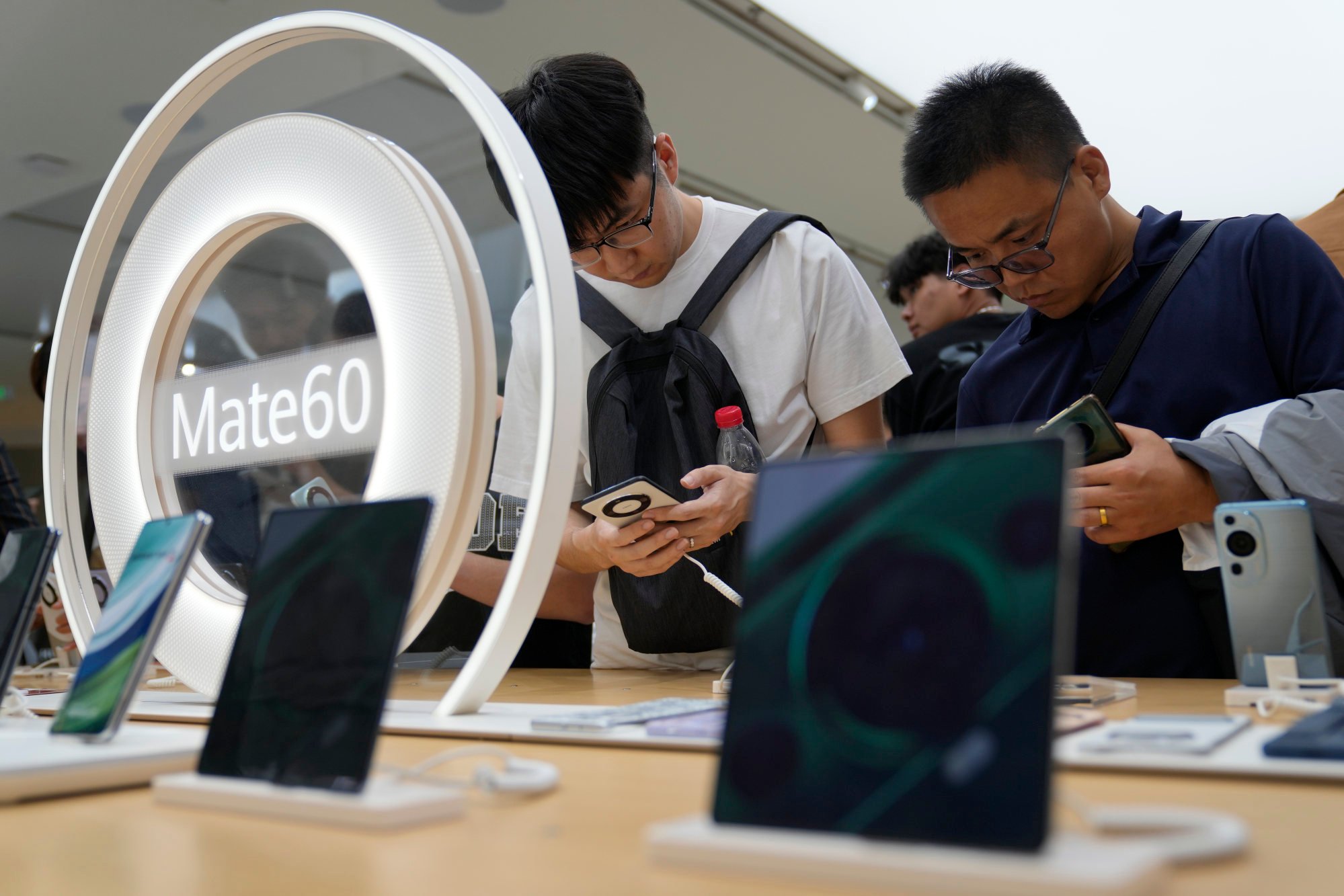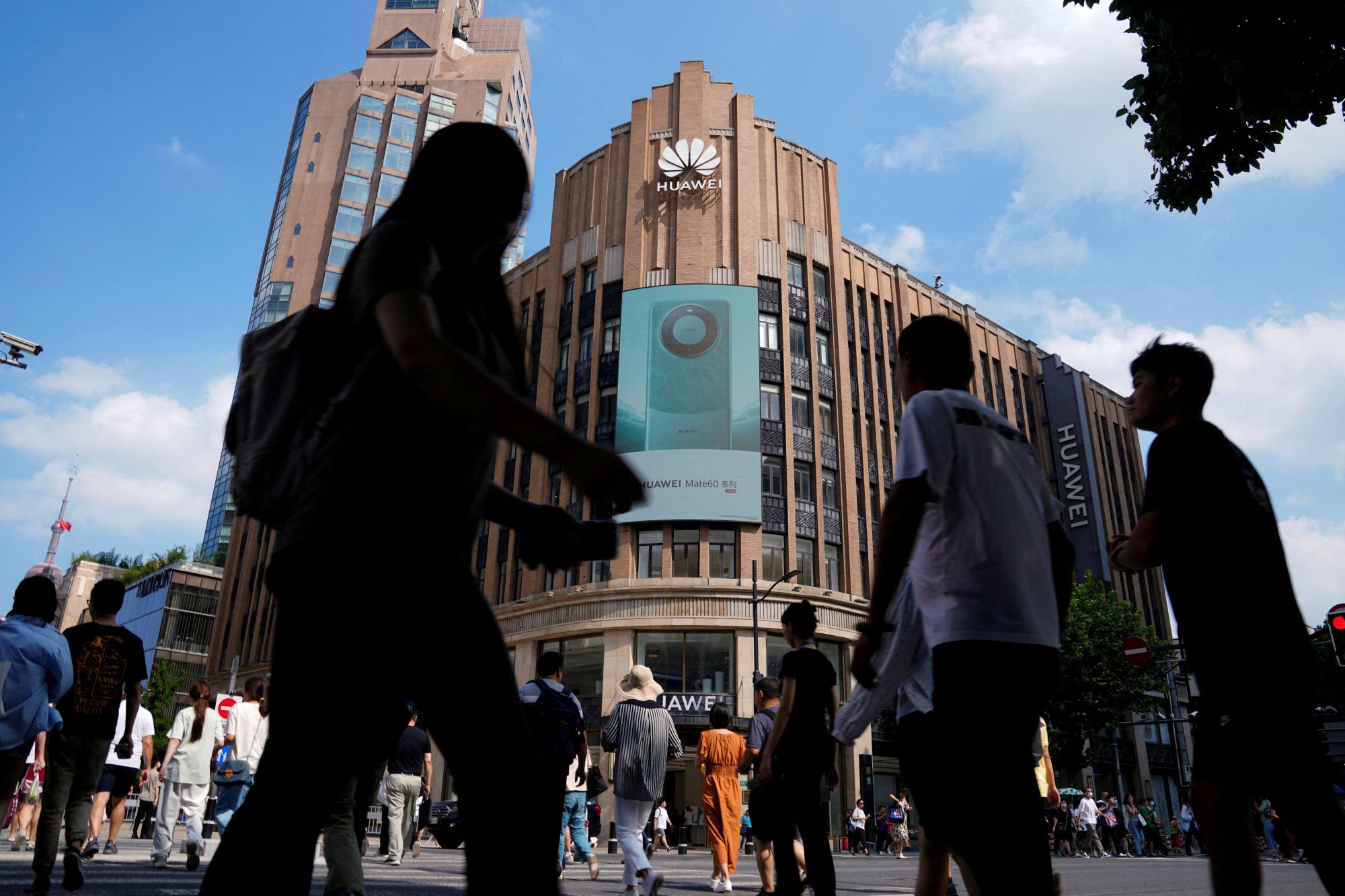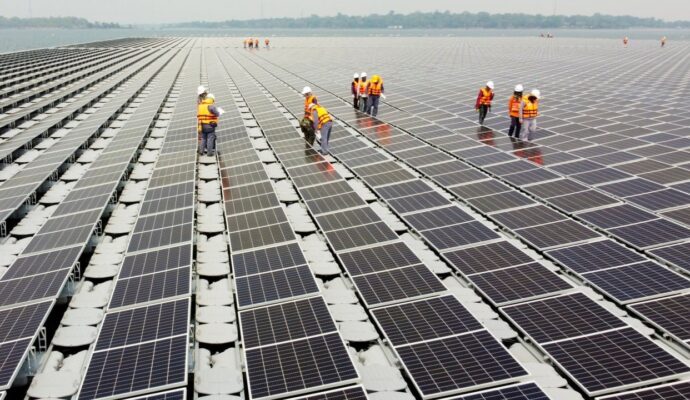It is part of a bigger picture that China is painting of US decline in which the failure of US containment efforts reflects the United States’ shrinking global influence.
But, equally, voices are growing in Washington that China’s decades-long “economic boom is over” and it is the one on the wane.
The competing stories each tells of the other’s fading glory are attempts both at suppression and to serve domestic agendas, observers say, but such tactics could be dangerous and could spin relations between the two countries out of control.
Support for China’s tech titans was in full flow in mainland media last month.
In two comment pieces published by the Global Times last month, the authors slammed US measures in recent years that have targeted China’s hi-tech field, including banning semiconductor exports and “coercing” its allies to do the same. They said Huawei’s chip breakthrough now proved that the US tech containment, which was triggered by “hegemonism” and “unilateralism”, had failed.
“The release of Huawei’s new products shows that US restrictions cannot stop China’s progress in the field of science and technology, and will trigger widespread questioning of US technological hegemony by countries around the world, including its allies.”
The US has ramped up tech restrictions against China over “national security concerns” in recent years, from sanctioning tech giants such as Huawei, ZTE and SMIC to banning tech investments in the country. These aim to limit Beijing’s access to sensitive technologies that would help advance its hi-tech and military development, as competition between the two superpowers has intensified on all fronts.
Beijing has retaliated by banning American chip company Micron’s sales to certain Chinese clients and restricting exports of two critical chipmaking materials.
Yun Sun, director of the China programme at the Washington-based Stimson Centre, said the Chinese narrative about the US failing its containment strategy might help rally domestic opinion, but one single case of Huawei’s chip was not enough to prove China has broken the American tech blockade.
“The US and China are engaged in a long-term competition and any declaration of victory or prediction of the other side’s upcoming defeat is premature,” she said.
China’s envoy to US calls for ‘concrete, small steps’ in relations
China’s envoy to US calls for ‘concrete, small steps’ in relations
Paul Triolo, an associate partner for China and technology policy lead at Albright Stonebridge Group, said Huawei’s new phone, which uses a Kirin 9000s 7nm chip made by Chinese chip maker Semiconductor Manufacturing International Corp (SMIC), offered a “major triumph” for innovation in the domestic industry.
But there were still many questions about whether the two companies could maintain or increase the chip’s yields, or make more advanced chips in future production.
“The technology cold war remains at the centre of US-China relations,” he said.
“The Mate 60 definitely represents a milestone in Chinese company efforts to navigate around the US export control system. How big of a milestone remains unclear, because of the lack of a well-defined road map for continuing to move to more advanced manufacturing processes.”
However, Chinese contentions of US desire for dominance and its decline go well beyond technology.
In a series of reports in the past year, Beijing has lashed out at the dangers of the “US hegemony” which, it says, has expanded on all fronts as the US feels its global dominance is declining. The reports cited examples such as the trend of “de-dollarisation”, America’s shrinking influence in the Middle East, and its inability to sway many countries to counter China.
America’s containment measures against China, including taking advantage of its alliance systems to impose tariffs and sanctions, expanding military activities in the Indo-Pacific, and “de-risking” ties, are also a direct result of its decline, China has claimed.
“Viewing China as a ‘risk’ is because of [the US’] declining competitiveness and fear of the end of hegemony,” a comment piece published by state news agency Xinhua said in July.

Moritz Rudolf, a China specialist at the Yale Law School, said the Chinese narrative about America’s decline was an exaggeration. Beijing’s purpose was to try to reach “a level of equality” with the US, which also wants to maintain its “unipolar moment”.
“While there is a trend of relative decline, the US still has a significant economic, cultural and military advantage over [China],” he said.
Bloomberg Economics predicted in September that China’s GDP may never surpass that of the US considering its current economic slowdown prompted by its export slump, property crisis and weak business confidence as well as the long-term issue of its shrinking population. According to Bloomberg, China’s economic growth may slow to 1 per cent by 2050, compared with America’s 1.5 per cent.
It is a view reflected in Washington.
In a political fundraiser event in August, US President Joe Biden said China was now a “ticking time bomb” because of its ageing workforce and high unemployment.
“When bad folks have problems, they do bad things,” he said, pointing to China’s economic struggles as a source of instability in the world.
During an election year, what do you do? You always point to somebody else and say, ‘Oh, it’s their problem – they’re having bigger problems than us’
Einar Tangen, senior fellow at the Taihe Institute and founder of Asia Narratives, said the US portrayal of China’s so-called decline was a “gaslighting” technique by the Biden administration seeking to shift attention from domestic challenges as the 2024 election nears.
With inflation easing, the US Federal Reserve held interest rates steady in September following months of aggressive rate rises, while a strong labour market and accelerating consumer spending all seem to indicate that the US economy has maintained its resilience despite early recession fears.
Tangen added that through all the tough measures it had imposed on China, the US aimed to create “uncertainty” to drive capital outflows from China.
“The US is doing all of these things and then they’re saying … China’s in trouble because of the things that we’re doing,” he said.

“But they’re not saying that. What they’re saying is that there’s some weakness in the economy – yes, part of it is, [but] this whole issue is that there’s a real concern about the rise of China.”
Ding Yifan, a researcher who specialises in world economy at the Development Research Centre of the Chinese State Council, said the US had “magnified” China’s economic problems.
“[The US] deliberately said that China’s economy will fall behind the United States,” Ding said, adding that its aggressive rate hikes had actually created large interest margins with China, which had led to depreciation of the Chinese yuan in the short term.
“Since the pandemic, our small and medium-sized enterprises indeed encountered many difficulties, mainly related to debts. We had no problem with GDP growth at the beginning, but there were problems with those enterprises, debts and employment. But these were magnified by them as structural problems.”
Chinese officials have also denied US theories that its economy is in crisis, saying post-pandemic recovery takes time and its economy is improving. August economic data showed improving retail sales, industrial production and urban employment, as the central government continues to implement policies to ease local debts, support private enterprises, lower mortgage rates and relax buying restrictions to boost house sales.
“China’s economy has not collapsed … What has collapsed is such rhetoric, not China’s economy,” foreign ministry spokeswoman Mao Ning said.
Sun from the Stimson Centre said the US narrative that China had failed economically fostered “a sense of triumphalism” that the US had won in its competition with China, which would also make the US more confident in dealing with China.
But she doubted either side’s narratives would affect their strategies towards each other.
“Such narratives only colour the countries’ assessment of their own policies,” she said.
Rudolf from the Yale Law School said opposing narratives about each other’s decline could be dangerous and could further deteriorate US-China ties.
“With the economic situation in China potentially worsening, the US election campaigns starting, and the upcoming Taiwan elections, there is a real risk of the situation spinning out of control,” he said. “A stable arrangement of coexistence appears to be in everyone’s best interest.”
Tangen from the Taihe Institute said US containment against China would be an ongoing trend. Instead of reacting negatively every time to US measures, China could focus on expanding its advantages in areas such as automation, 6G, and potential further chip breakthroughs – production of gallium oxide, for example, a difficult-to-make new-generation semiconductor banned by the US that China has recently developed a new production method for.
“I don’t think it’s constructive … the US says, oh, China’s in decline and China says, oh no, you’re in decline. That sounds like stuff in the schoolyard,” Tangen said. “I don’t know if that’s going to solve anything.
“I don’t think that the US can be an adult at this stage because of the two-party political system and the division. So it’s going to be up to China to be more creative and to be the adult in the room and do what’s necessary.”




